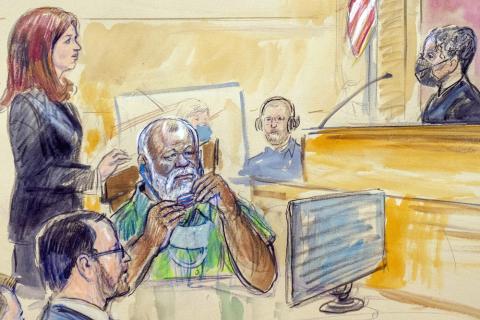
The judges who convicted a Libyan for the Lockerbie bombing reached an unjustified verdict by cherrypicking facts from a mass of conflicting evidence, an appeal court has been told.
Claire Mitchell QC, an advocate acting for the family of Abdelbaset al-Megrahi, accused the Scottish judges who jailed him nearly 20 years ago of taking a “broad-brush approach” to contradictory claims from unreliable witnesses.
“The court has read into a mass of conflicting evidence a pattern or conclusion which is not really justified,” Mitchell told five Scottish appeal judges on Tuesday. None of the most significant evidence against Megrahi met the “baseline of quality” needed for a conviction, she said.
She was addressing the court on the opening day of a posthumous appeal against Megrahi’s conviction for planting the bomb which brought down Pan Am Flight 103 over the Scottish town of Lockerbie on 21 December 1988.
It was the worst terrorist attack in UK history, killing all 259 passengers and crew on the flight from Heathrow to New York, as well as 11 townspeople.
Megrahi was the only person convicted for the bombing, by a specially-convened Scottish court sitting without a jury in the Netherlands from May 2000 until January 2001. He immediately lodged an appeal, insisting he was innocent.
Five years after losing that appeal, the Scottish Criminal Cases Review Commission (SCCRC) ruled in 2007 his conviction could be unsafe, returning it to court. In 2009, Megrahi was diagnosed with terminal cancer, and abandoned his case after winning compassionate early release. He died at home in Tripoli in 2012.
In May 2020 the SCCRC ordered a fresh appeal on behalf of Megrahi’s family, which is being held this week in a virtual hearing chaired by Lord Carloway, the lord justice general and Scotland’s most senior judge.
Mitchell said his conviction hinged on the original court’s decision to rely on the uncorroborated claims of Tony Gauci, a Maltese shopkeeper who alleged several years after the attack that Megrahi had bought 12 items of clothing found in the Samsonite suitcase holding the bomb.
She listed a series of inconsistencies in Gauci’s testimonies and in the trial court’s decision to fix the date of that purchase as 7 December rather than 23 November, an alternative date which the evidence also pointed to.
That date was central to Megrahi’s conviction. The senior Libyan intelligence officer was only in Malta on 7 December but was not in Malta on 23 November.
Gauci had initially repeatedly identified an Egyptian terrorist called Abu Talb as the man who bought the clothes, only to identify Megrahi later. He also first recalled the purchaser being four inches taller and nearly 30 years older than Megrahi.
Gauci claimed it rained when the purchaser left his shop; the nearby airport’s meteorologist said he did not believe it rained on 7 December. It did, however, rain on 23 November. Gauci also gave contradictory evidence about whether the town’s Christmas lights were lit on 7 December or not.
“As things stand, we have someone who cannot remember dates and is hopelessly muddled,” Mitchell said. She told the judges “the evidence was so inconsistent, so riddled with inaccuracies, that no jury could have held that the date of purchase was 7 December. [It] simply didn’t bear the weight put upon it.”
Further, there was no evidence the suitcase bomb began its unaccompanied journey on a KLM flight from Malta to Frankfurt, as the prosecution claimed, before being inserted on a Pan Am feeder flight to Heathrow.
The UK and Scottish governments are contesting the appeal, and the hearing will hear later evidence that the US government secretly paid Gauci and his brother a total of $3m for their testimony – a fact withheld from the original trial.












